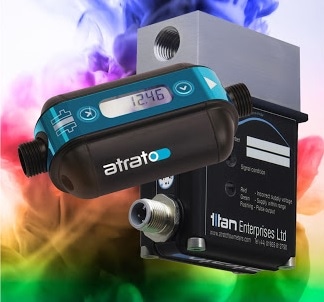Titan Enterprises reports on how its flowmeters are being used by filter manufacturers to test the effectiveness of their products.
 Filters are used in many processes to remove particulates from a fluid or gas flow. A typical liquid filter efficiency testing procedure uses a simple circuit consisting of a fluid reservoir, contaminant to be removed injection point, a pump and the filter under test. Monitoring of the loop is usually done using particle counting equipment before and after the filter to test the removal efficiency. In addition, the set-up uses a differential pressure gauge to monitor the pressure loss across the filter when a known amount of added contaminant has been removed by the filter. And finally, a flowmeter, usually installed after the filter, is used to measure the volumetric throughput of fluid through the system.
Filters are used in many processes to remove particulates from a fluid or gas flow. A typical liquid filter efficiency testing procedure uses a simple circuit consisting of a fluid reservoir, contaminant to be removed injection point, a pump and the filter under test. Monitoring of the loop is usually done using particle counting equipment before and after the filter to test the removal efficiency. In addition, the set-up uses a differential pressure gauge to monitor the pressure loss across the filter when a known amount of added contaminant has been removed by the filter. And finally, a flowmeter, usually installed after the filter, is used to measure the volumetric throughput of fluid through the system.
Using this set-up - particle size and contaminant removal efficiency can be recorded giving vital technical information for a filter manufacturer, filtration equipment supplier and ultimately more information for a process engineer to aid their selection of the optimum filter for their application.
Over recent years, Titan Enterprises has worked with several filter manufacturers to develop optimised flowmeters to meet the different demands of their particular test rigs. These flowmeters range from quite low flow devices through to larger systems and even bypass filtration systems. In bypass filtration applications - a continuous measurement is made of the flow through the filter where the majority of the flow bypasses the element but the proportion that is filtered is usually to a much higher level than could be readily achieved with a full flow filter. Over time the whole of the fluid is thus filtered to a very high standard.